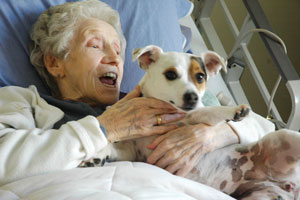

Even though continuing care patient Eva can’t speak or understand a word other than German, her face lights up as Abby struts into her hospital room to greet her with a kiss on the face as she coos.
“Abby has been a blessing for these patients,” says Hardy, a recreational therapy assistant who brings the dog in to work every Wednesday morning.
Pets are one of the many things patients give up when they move into continuing care at the health centre, and even a chance to watch a young dog sniff around alleviates pain for residents.
“It helps them feel more at home,” says Hardy. “They get all the benefits of having a pet with none of the work.”
Eva Soukeroff is one of Abby’s favourite customers, always stopping by her room before heading home from her shift on the unit.
“She’s friendly and quiet,” says Soukeroff, who feeds Abby treats while going for a ride in her powerchair. “She’s a very good dog.”
This is the first time that a pet has been brought into the health centre consistently, although birds, cats, and even a baby bison have been brought in to entertain residents before.
Abby's mild, easygoing, and unintrusive temperament has made her the perfect pooch for the job.
“All animals can be used for therapy, but it takes a special dog to do this weekly,” says her owner. “She just loves coming in.”
There has been much research into the benefits of having small pets around patients.
In 1985, University of Pennsylvania researchers reported that stroking a dog or cat can lower blood pressure in individuals with hypertension.
Another study found that elderly people caring for a pet showed improved alertness. Dog owners who have suffered a heart attack have been found to be significantly less likely to die in the year following the heart attack compared to heart attack survivors who didn’t own dogs.
“A lot of people who are socially isolated or non-verbal immediately react when they see her,” Hardy says.
Loneliness may be the hardest burden on the ill, and having a dog as loving as Abby can make a world of difference for those stuck inside a health centre.
Says Hardy, “They have no expectations– they just want to sit and be loved, treating everyone equally.”